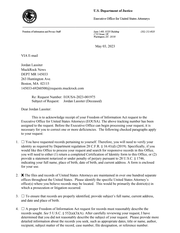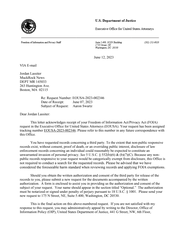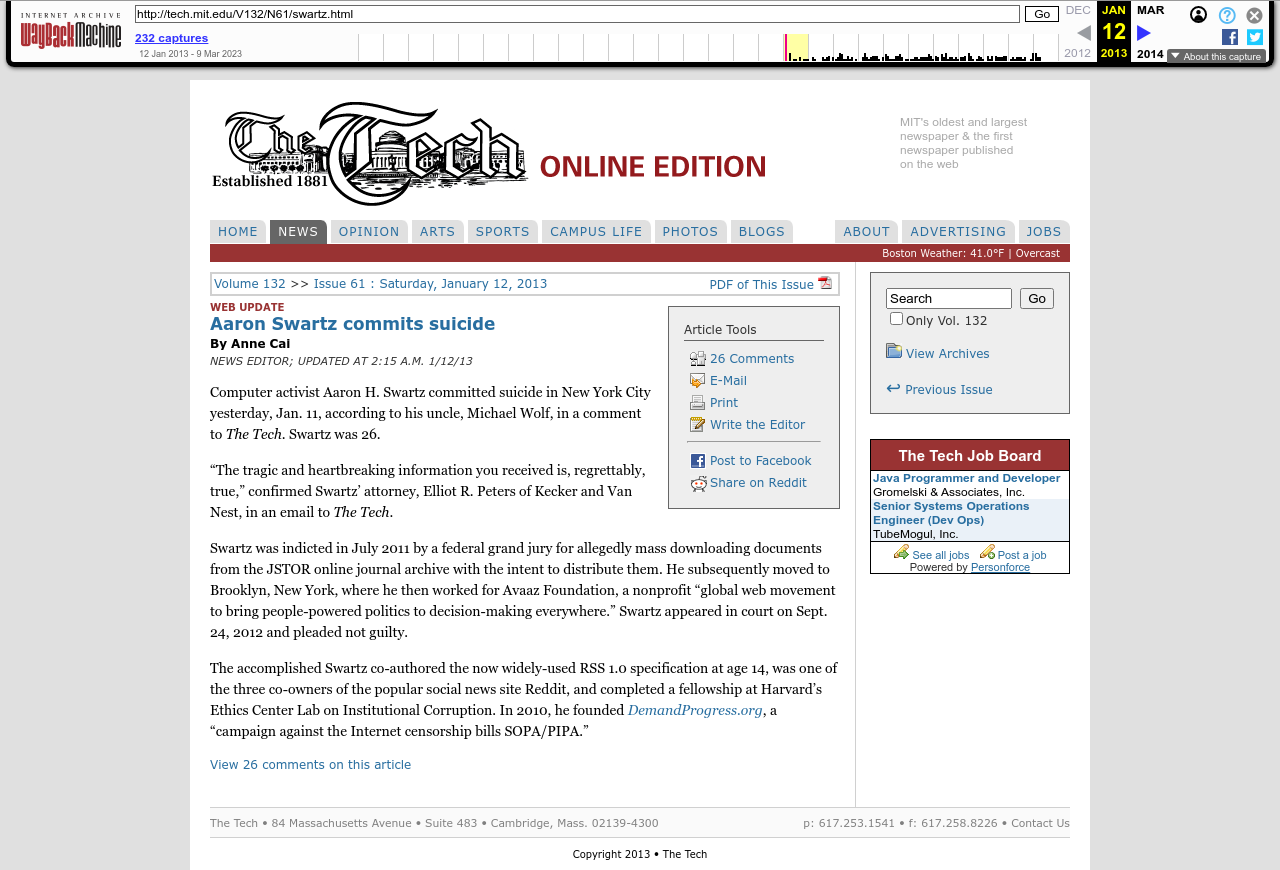Records on Aaron Swartz
It is a clone of this request.
| Tracking # |
EOUSA-2023-002346 |
| Submitted | April 26, 2023 |
| Est. Completion | None |
MuckRock users can file, duplicate, track, and share public records requests like this one. Learn more.
Communications
From: Jordan Lassiter
To Whom It May Concern:
Pursuant to the Freedom of Information Act, I hereby request the following records:
I am writing to request all records related to the criminal investigation of Aaron Swartz, including any records related to his alleged unauthorized access of the JSTOR academic database. Specifically, I am seeking all memos, documents, and inter-agency communications related to the investigation, prosecution, and settlement of the case. This includes any search warrants, surveillance records, or other investigative documents related to the case. Additionally, I am requesting any and all records related to the prosecution of Aaron Swartz, including court filings, briefs, and other legal documents.
As this is a request under the Freedom of Information Act (FOIA), I would like to remind you of your obligation to provide access to all non-exempt responsive records. Please note that any redactions or withholdings of responsive records must be narrowly tailored and justified under the FOIA exemptions. If any responsive records are withheld, redacted, or deleted, I request that you provide a detailed explanation for the basis of each such decision.
To ensure that my request is as clear and specific as possible, I am seeking records from any and all agencies involved in the investigation and prosecution of Aaron Swartz, including but not limited to the Department of Justice, the Federal Bureau of Investigation, and any other relevant agencies. This request specifically includes any and all records related to JSTOR, the academic database that was at the center of the allegations against Aaron Swartz.
Specifically, I am requesting any and all records related to the following topics:
The initiation of the investigation: This includes any tips, complaints, or other information that led to the investigation, as well as any communications or documentation related to the decision to initiate the investigation.
The collection of evidence: This includes any search warrants, subpoenas, or other legal process used to gather evidence, as well as any documentation related to the collection and analysis of evidence, such as forensic reports, lab reports, and chain of custody documents.
Surveillance and monitoring: This includes any surveillance or monitoring of Aaron Swartz, including wiretaps, pen registers, or other forms of electronic surveillance. This also includes any documentation related to the legal authorization for such surveillance, as well as any documentation related to the use and analysis of any surveillance or monitoring data.
Communications between agencies: This includes any communications between or among law enforcement agencies, including emails, memos, or other inter-agency communications related to the investigation or prosecution of Aaron Swartz.
Prosecution records: This includes any records related to the prosecution of Aaron Swartz, including court filings, legal briefs, and other legal documents.
Inter-agency coordination: This includes any records related to coordination and communication between agencies involved in the investigation and prosecution of Aaron Swartz, including any task force meetings or other inter-agency meetings related to the case.
Records related to JSTOR: This includes any communications or agreements between law enforcement agencies and JSTOR, as well as any documents related to JSTOR's cooperation with the investigation or prosecution of Aaron Swartz.
In addition to the FOIA, there are several court cases that support the release of the responsive records. These include:
United States v. Nixon, 418 U.S. 683, 698-99 (1974): This case established that the need for confidentiality must be weighed against the public interest in disclosure, and that the public interest in disclosure must be given significant weight.
Citizens for Responsibility and Ethics in Washington v. United States Dep't of Justice, 602 F. Supp. 2d 121, 126-27 (D.D.C. 2009): This case established that FOIA requires agencies to conduct a search for responsive records that is reasonably calculated to uncover all relevant documents.
American Civil Liberties Union v. Department of Defense, 628 F.3d 612, 619 (D.C. Cir. 2011): This case held that FOIA requires agencies to release any reasonably segregable portion of a record that is not exempt from disclosure.
Electronic Privacy Information Center v. Department of Homeland Security, 653 F.3d 1, 6 (D.C. Cir. 2011): This case held that agencies may not withhold responsive records under the FOIA unless they fall within one of the enumerated exemptions, and that any doubts regarding the disclosure of responsive records should be resolved in favor of disclosure.
New York Times Co. v. United States, 403 U.S. 713, 717 (1971): This case established that the public has a significant interest in the disclosure of government documents, and that the government may not withhold responsive records merely to avoid embarrassment or inconvenience.
For the purposes of this request, I have attached proof of Aaron Swartz's death, as he tragically passed away in 2013. Please note that any requests to withhold or redact responsive records must be narrowly tailored and justified under the applicable laws and regulations.
Finally, I would like to remind you that if any responsive records are withheld, redacted, or deleted, I reserve the right to seek review of your decision through the appropriate administrative channels, including appeal to the Office of Information Policy (OIP) and filing a formal complaint in federal court to compel disclosure.
The requested documents will be made available to the general public, and this request is not being made for commercial purposes.
In the event that there are fees, I would be grateful if you would inform me of the total charges in advance of fulfilling my request. I would prefer the request filled electronically, by e-mail attachment if available or CD-ROM if not.
Thank you in advance for your anticipated cooperation in this matter. I look forward to receiving your response to this request within 20 business days, as the statute requires.
Sincerely,
Jordan Lassiter
From: United States Attorney's Office for the District of Massachusetts
Dear Requester,
Please see attached correspondence regarding your request to EOUSA.
From: Jordan Lassiter
I am writing in response to a letter that I recently received from your office regarding my Freedom of Information Act (FOIA) request for records related to the criminal investigation of Aaron Swartz.
Unfortunately, I must inform you that your letter appears to have been misdirected, as it contains information that is not relevant to my FOIA request. Additionally, the subject line of your letter is incorrect, as it references a deceased individual named Jordan Lassiter. I would like to clarify that I am the requester in this case and my name is Jordan Lassiter.
As I am sure you are aware, my FOIA request seeks all records related to the criminal investigation of Aaron Swartz, including any records related to his alleged unauthorized access of the JSTOR academic database. Specifically, I am seeking all memos, documents, and inter-agency communications related to the investigation, prosecution, and settlement of the case. This includes any search warrants, surveillance records, or other investigative documents related to the case. Additionally, I am requesting any and all records related to the prosecution of Aaron Swartz, including court filings, briefs, and other legal documents.
To the best of my knowledge, my FOIA request is directed at the United States Department of Justice and its various components, not the Massachusetts District Attorney's office. If your office does not possess any responsive records to my request, please inform me as soon as possible so that I may direct my request to the appropriate agency.
Thank you for your attention to this matter. I look forward to your prompt response.
Sincerely,
Jordan Lassiter
Was this response b
From: United States Attorney's Office for the District of Massachusetts
Dear Requester,
Please see attached correspondence concerning your request to EOUSA.
Regards,
EOUSA FOIA/PA Staff
From: Jordan Lassiter
Dear Kevin Krebs,
Receiving instructions on how to appeal for information under the Freedom of Information Act in relation to Aaron Swartz paints quite the ironic tableau, wouldn't you agree?
We are, after all, discussing the principles of open access to information, an ideology that Mr. Swartz fervently championed. A stance, I might add, that put him squarely in the sights of a Department of Justice prosecution that many argue contributed significantly to his untimely demise.
But perhaps, we should set aside the sardonic observations for a moment. In this letter, I have enclosed a copy of an article that details the unfortunate passing of Mr. Swartz. This article serves as a grim reminder of the real-world consequences that can arise from institutional actions.
Although your advice on submitting an appeal is appreciated, I am hopeful that the process of uncovering the truth can continue without further obstructions. I trust the Department of Justice is as committed to transparency as Aaron Swartz was to the open dissemination of knowledge.
With this in mind, I look forward to your assistance in clarifying the circumstances surrounding Mr. Swartz's case, and I trust you will handle the enclosed document with the gravity it warrants.
Yours sincerely,
Jordan Lassiter
From: Jordan Lassiter
Attached
Files
pages





